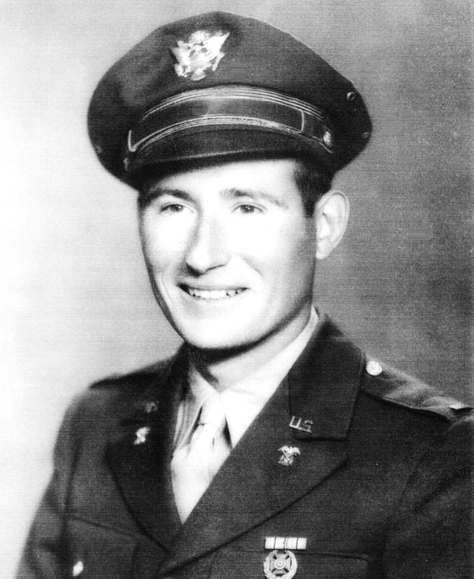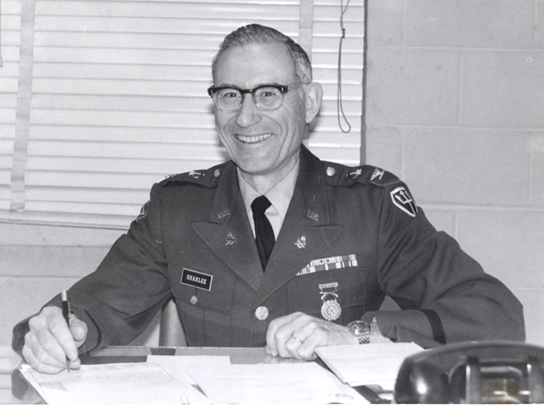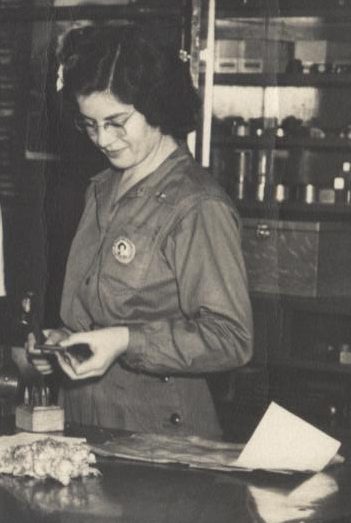
When the Japanese bombed Pearl Harbor, Hawaiian Islands, 7 Dec 1941, beginning the US entry into World War II, I was a senior at Oklahoma A. & College in Stillwater and was enrolled in the Advanced ROTC program. Upon graduation I was commissioned a Second Lieutenant 14 May 1942. I was ordered to active duty 6 July at the Enid Army Basic Flying School , now Vance Air Force Base. The most significant impact of World War II on my life occurred the next Sunday when I attended the First Methodist Church in Enid and met Rose Marie Miller.
I reported 4 Aug to the Provisional Battalion, Officer Training School, Fort Francis E. Warren, near Cheyenne, WY. There I was in training until assigned to the unit in which I would spend the bulk of World War II. On 8 Nov I reported to the 469th Quartermaster (QM) Truck Regiment, Camp Maxey, near Paris, TX, one of four white officers in Company B. Our 120 enlisted men were “colored”, today we would call them African-American. My promotion to First Lieutenant was 7 Apr 1943.
During almost a year of training, including maneuvers in Louisiana from 13 Apr to 30 Jul, we converted our men into a good truck company. On 24 Oct we left Camp Maxey by train for Camp Stoneman, near SanFrancisco, CA. We left the US 1 Nov on the Nieuw Amsterdam, said to be the 15th largest ship afloat at that time. On 17 Nov we docked at Wellington, New Zealand, stretched our legs with a hike in the city, then returned to the ship. We arrived at Camp Hargrove near Sydney, Australia, 19 Nov where we became acclimated. We left Sydney by train 24 Nov for Camp Freeman near Brisbane. There we performed our first real war work, hauling supplies to and from ships and Quartermaster Depots, including helping to break up a strike of civilian Australian truck drivers. Company B, 469th QM Truck Regiment, was redesignated the 3662nd QM Truck Company 2 Dec.
We left Camp Freeman 16 Jan 1944 in the Australian ship HMAS Kanimbla and pulled into Finschaffen, New Guinea, 23 Jan. That was our home for the next 16 months. Our first night at Finschaffen was interrupted by an air-raid alarm followed by several big explosions. The alarm sounded three times that night and later it was reported seven bombs were dropped by Japanese warplanes. Three or four American soldiers were killed and more than 30 injured in nearby units during the raid, but our company had no casualties.
At Finschaffen our company hauled troops and supplies from ships at dockside to camps and supply depots and vice versa. Supplies consisted of ammunition, military equipment, clothing, medicines, gasoline, rations, beer, mail, and occasionally American casualties in pine coffins for burial in the Finschaffen military cemetery. Usually we worked 12-hour shifts and kept the trucks moving around the clock. Finschaffen was one of the busiest military ports in the South Pacific and was extremely hot and humid. Many of the men suffered constantly from heat rash. Malaria was controlled with small yellow atabrine pills, but Dengue fever affected many from time to time. Our troops had practically no contact with the local population, which consisted of aborigines. They could converse only in pidgin English.
One of the highlights at Finschaffen occurred 19 Jul when the Jack Benny United Services Organization (USO) show in the flesh came to the Naval Base. Other members of the troupe were Carole Landes, Martha Tilton, June Brunner, Larry Adler and Lanny Ross. On another occasion Irving Berlin appeared in person with his USO show 14 Feb 1945 at the Base Theater to entertain our troops. His show was billed, “This Is The Army”.
Soon after Victory Europe Day on 27 May 1945, we left Finschaffen on Landing Ship Tank #569 and arrived at Manila, Philippine Islands, 13 Jun. Our activities at Manila were much like those at Finschaffen. However, the Filipinos were quite a contrast to the New Guinea natives. They were rather well educated and we hired them to do much of the routine work around the camp. Also the dock areas of Manila that had not been destroyed by war activity were much better and more extensive than those at Finschaffen. Even though Manila had been badly damaged, it was a modern city with much civilian vehicle traffic. I was appointed Battalion Investigating Officer to settle accidents between military and civilian vehicles. By that time my other duties in the company included Executive Officer, First Platoon Leader, Mess Officer, Athletic and Recreation Officer, Civilian Labor Control Officer, Class A Agent for Civilian payrolls, Company Historian, Fire Marshall, Information and Education Officer, Insurance Officer, Intelligence Officer, Malaria Control Officer, Plans and Training Officer, Public Relations Officer, Recruiting Officer, Soldier’s Deposit Officer, Special Services Officer, Venereal Disease Control Officer, and War Bonds Officer. Victory Japan Day ended World War II 15 Aug.
On 23 Aug I was transferred from the 3662nd QM Truck Company to the 48th QM Battalion and was appointed battalion adjutant. That job involved much paperwork and desk activity. I served in that capacity until assigned to the 1314th Engineer Company for the purpose of returning to the US.
We left Manila on the USS Duchess 6 Jan 1946 and arrived under the Golden Gate Bridge on 25 Jan. Then to Fort Leavenworth, KS, by train to be separated from active duty 1 Feb. I joined the Officers Reserve Corps in the US Army Reserve (USAR) and headed home. Rose and I were married 24 Feb. My terminal leave ended 26 Apr.
My World War II military decorations included the Asiatic-Pacific Service Medal with bronze star for the New Guinea Campaign, and bronze star for the Luzon Campaign; American Theater Medal; and World War II Victory Medal. A significant result of my military service in World War II permitted me to take advantage of the G. I. Bill of Rights. It helped me earn a Master of Science degree in genetics at the Iowa State College, Ames, IA; and a Doctor of Philosophy degree in Poultry Physiology at the University of Maryland, College Park, MD. They resulted in a civilian career as poultry geneticist with the US Department of Agriculture at Beltsville, MD, and Washington, DC.
In the USAR I transferred from the Quartermaster Corps to the Civil Affairs (CA) Branch in 1953. I was promoted to Captain in the 450th CA Company 16 Nov 1954; Major in the 310th CA Group 15 Nov 1961; Lieutenant Colonel in the 354th CA Headquarters (B) 7 Apr 1966; and Colonel in the 352nd CA Command 27 Mar 1970. Additional military decorations issued to me while in the USAR were: Armed Forces Reserve Medal; Bronze Medal for Excellence in Pistol Competition, Certificate of outstanding service, 352nd CA Area (A) Headquarters; Army Reserve Components Achievement Medal; US Army Meritorious Service Medal; Philippine Liberation Medal; and Philippine Republic Presidential Unit Citation Badge.
Our commanding general was promoted to Major General and I was one of three (out of 40 Colonels in our command) who were nominated 13 Jul 1972 to take his place. Although I was not selected, the Colonel who was selected for the promotion to Brigadier General appointed me his Chief of Staff and the other nominee became Deputy Commander. My principal Army Reserve duty was Food and Agriculture Officer; secondary duty, Marksmanship Coordinator, final duty assignment, Chief of Staff. I was a member of pistol marksmanship teams of the 354th CA Headquarters (B), 352nd CA Headquarters (A), 352nd CA Command, 97th US ARCOM, XXI US Army Corps and First US Army. I transferred to the Retired Reserve 8 Jul 1975. We moved to Enid and later I was Director of the Retiree Activities Office and editor of the retiree newsletter, Vance Air Force Base, Enid, OK, from 1986 to 1988.

Rose Shaklee's essay - "Those That Stayed Home to Wait"

On the evening of Dec. 7, 1941, we were in a jolly mood as we arrived for Epworth League at the First Methodist Church of Enid. There we learned the terrible news. The Japanese had bombed Pearl Harbor with devastating results. We were stunned. I don’t remember if we went ahead with our youth meeting and with church as usual. At that point none of us could fathom that our lives and our world would never be the same again.
I was in my junior year at Phillips University and like everyone else had trouble concentrating on studies as thoughts of impending war occupied every waking moment. Soon the young men volunteered or were drafted. The Oklahoma 45th Division National Guard, which included many of our friends, was called to active duty. Eventually they were in the North Africa Campaign and then went on into Italy. The report came that one of our young men from church was killed acting as a litter bearer. The war had begun to hit home.
Sweethearts married, some on the eve of his overseas assignment. Young wives went to be with their husbands until they were sent overseas. Women went to Wichita or elsewhere to work in war plants. Nurses answered the call to enlist. Rationing became a reality, causing women to collect sugar-free recipes, or trade excess sugar stamps for other stamps they needed. Women mended silk stockings to make them last. War bond rallies and scrap metal drives were held. Victory gardens were planted. Everyone walked or rode the bus to save gasoline.
My oldest brother had finished college and started graduate school. He was drafted immediately. Two younger brothers were each drafted as soon as they turned 18, leaving my 14 year old brother to try to help my dad keep the farms in operation.
Some of us put out a weekly paper at the church to send to our servicemen. We included news garnered from letters the men sent to us. They appreciated hearing about their buddies and being able to contact one another from current addresses we published. We told of leaves, marriages, births, and passed on home-church gossip.
The Army opened a flying school outside Enid, and in the summer of ‘42 I met a young lieutenant who was temporarily stationed there. We had a few dates, then he went on to Wyoming, never to be heard from again, I thought. I underestimated the persistence of young Bill Shaklee. We celebrated our 60th wedding anniversary in February.
By the time my sister and I graduated from college in 1943, there were no male graduates except for ministerial students and those who were 4-F. My sister’s fiancé had joined the Navy, so she took a job teaching art in the Okmulgee schools. I had finished out the last six weeks of the school year at Carrier High School for a young English teacher who had gone to be with her husband. I stayed with my folks on the farm west of Enid and caught a ride the eight miles to Carrier. I continued teaching at Carrier the next school year even though it took some maneuvering. My young brothers drove to Enid High and took me as far as the filling station on the highway. There I met a carpool of teachers from Enid who were pooling gasoline coupons to drive out to Carrier to teach. If I remember right I received the princely salary of 65 dollars per month. Male teachers received more!
By this time Bill and I were engaged, but elected to wait until the war was over to marry. We had no idea it would last so long.
It was not a good year. The boys couldn’t worry about school work. They were counting the days until they were 18 and could go fight the Japs. The girls had their minds on -- you guessed it -- the boys. No one flunked, but some came close.
When summer came I decided I could make more money, and have less stress, by working at Failings, a local plant manufacturing portable water well drilling equipment for the Army. Mr. Failing had to hire his quota of girls even though he disliked having females in his shop. That’s how I became “Rosie the Riveter”. Only my job was in the inspection department making sure the machinists’ work was perfect. Our plant earned the E for Effort which was presented with proper ceremony, and an E flag was placed on the flagpole beneath the US flag. We each received an E pin to wear.
There were three other inspectors, another young lady and two men. One man was just beyond draft age with two children, the other was old -- probably 50. The men in the shop were a like range of ages. Several girls worked in the shop pushing carts full of parts from one department to another. The year went well except I was introduced to the Coffee Break where donuts were available. Shall I tell you about the 10 pounds I gained? I walked the mile to work until one of the men starting picking me up on his motorcycle.
My sister and her fiancé decided to get married in April of 1944. He was coming home on leave before going for training in New England, and she could be with him there. Weddings were difficult. She finally found a dress which could be altered to fit her. Could we get enough gasoline to bring her home from Okmulgee? Would the re-treaded tires take that many more miles? Or would she have to try to take the bus, with all her possessions, when the schedule included two transfers? My brother did manage to go for her, even picking up some relatives in Tulsa on the way back. He made it! We made wedding arrangements at our Enid church. Guests had problems getting wedding gifts. Linens? Not available. China? Not available. Tableware? Sterling silver only. Crystal? Limited pieces left from prewar days. Never mind, they were married, and we gave them a good sendoff.
We celebrated the end of the war in Europe May 8, 1945. But the end was not yet. August 14, 1945, was truly the day to celebrate. That evening everyone joined in singing and dancing around the square. Newsboys yelled, “Extra! Extra! Read all about it!” Somehow we thought our men would be home tomorrow, if not sooner. Those next few months were long for some of us. First off, the shop girls at Failings got two weeks pay and walking papers. Mr. Failing would no longer have to put up with females in his shop! Did I fail to mention how he loved to watch the lovely office ladies in their short dresses? No uniforms!
I worked the next five months at a local hospital until Bill came home in January of 1946 and rescued me. We were married February 24 with some of the same difficulties my sister had experienced. Bill had to wear his uniform because men’s suits were not yet available. Who cared? The war was over for us!
© Copyright 2004-2009 - All Rights Reserved, Teresa Shaklee Kasner, Website Administrator